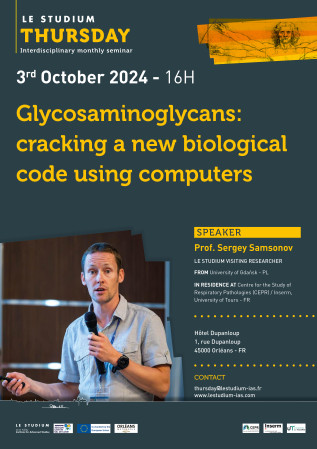Glycosaminoglycans: cracking a new biological code using computers
Hôtel Dupanloup
1 rue Dupanloup
45000 Orléans
France
Presentation
A living organism represents a collaborative network of billions of versatile molecular machines. which “know” exactly what to do. Therefore, the central objective in life sciences is to understand highly specific interactions of molecules comprising these machines and what is the origin of this specificity. The discovery of the genetic code revealed how genetic information is realized through DNA sequences of 4 nucleotides. Most cellular machinery is driven by proteins, made of 20 amino acids put in a linear chain encoded by DNA. For a long time, other biomolecules like carbohydrates and lipids were considered “passive” structural material, but it’s not that simple. Carbohydrates are made of hundreds of units, often branched, contributing to their overwhelming complexity. Glycosaminoglycans (GAGs) are a class of linear periodic negatively charged sulfated carbohydrates. GAGs interact with proteins in the space between the cells affecting biochemical processes related to cancer, Alzheimer’s and Parkinson diseases, tissue regeneration and viral infection. Their functions are defined by how they are sulfated, termed as “sulfation code”, which is poorly understood. Due to ever growing computational power and the challenges of experimental techniques to study these molecules, theoretical attempts to decode the “sulfation code” are especially promising. Our goal is to understand the fundamental principles underlying the function of GAGs using computational approaches to enable novel strategies for the medical use of GAGs. In this talk I will introduce GAGs, the basic theoretical concepts we apply to study them and briefly refer to the Le Studium project carried out with Prof. Fabien Lecaille at the University of Tours
Speaker
LE STUDIUM Visiting Researcher
FROM: University of Gdańsk - PL
IN RESIDENCE AT: Centre for the Study of Respiratory Pathologies (CEPR) / Inserm, University of Tours - FR





